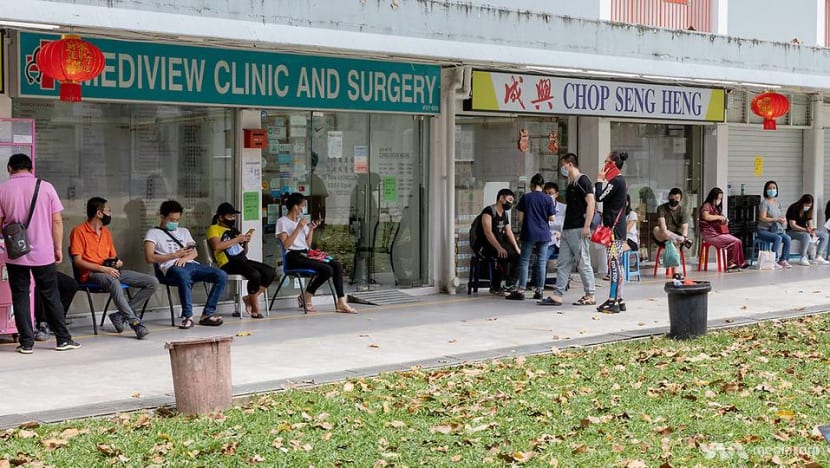Sinovac vaccine recipients excluded from national tally; 'little data' on efficacy against new COVID-19 variants

People queuing for the Sinovac COVID-19 vaccine outside Mediview Clinic and Surgery at Lorong 1 Toa Payoh on Jul 2, 2021. (Photo: Ili Nadhirah Mansor/TODAY)
SINGAPORE: Those who have received Sinovac vaccinations do not count towards national vaccination targets because there is still “little data” on the vaccine’s efficacy against COVID-19 variants of concern, said Associate Professor Kenneth Mak, the Health Ministry’s director of medical services on Wednesday (Jul 7).
He said this in response to a question at a media conference by the COVID-19 multi-ministry task force on why this group was being excluded from the national tally, along with possible perks for those who have been vaccinated.
READ: People fully vaccinated under national exercise may be able to gather in groups of 8 from end-July
Assoc Prof Mak explained that authorities do keep track of how many people have received Sinovac vaccines.
But they have not attempted to “conflate the reporting” of these numbers with those who have received vaccines under the national vaccination programme, of which there are currently two - Pfizer-BioNTech/Comirnaty and Moderna.
This is “to better reflect the efforts we're taking within our national vaccination programme to get the population vaccinated and to achieve the milestones”, he said.
Specifically, he noted this is also because there is “little data” concerning the efficacy of the Sinovac vaccine against variants of concern, particularly the Delta variant.
“Whereas in the other vaccines that we are using, the mRNA vaccines, there's a little bit more data available at this point in time concerning the vaccine efficacy against the Delta variant.
“This is partly the reason why we've chosen, in our milestones, to rely on the more tested vaccines that we have sufficient evidence (for),” he said.
READ: The Big Read: As COVID-19 becomes endemic, it’s a race against time to get more seniors vaccinated
He added that when Sinovac vaccination numbers “build up”, authorities may provide more information.
Health Minister Ong Ye Kung expressed gratitude to those opting for Sinovac vaccines and said they, too, were "contributing to the resilience" of the population.
He also noted that though the Sinovac vaccine is widely used in China, for instance, the country has not really experienced the Delta variant.
“It is being used in places like the UAE (United Arab Emirates) and Indonesia that are now experiencing the Delta variant, but data is not coming out from these places as well," he added.
“So really we don't really have a medical or scientific basis … to establish how effective Sinovac is in terms of infection and severe illnesses (from the Delta variant). But I hope this data will emerge soon and allow us to make an assessment,” he said.
As of Jul 3, 17,296 people in Singapore had received one dose of the Sinovac vaccine, according to figures provided by Mr Ong in a written response to a parliamentary question.
READ: Full COVID-19 vaccination provides 69% protection against infection by Delta variant: Singapore study
Mr Ong added that even when 50 per cent of the population has received two vaccine doses, there will still be a need to differentiate between vaccines.
“But once we reach an even higher level of vaccine coverage, we will have stronger herd protection, which means this vaccine effectiveness may be less of a factor.
“And therefore, in time, we should be able to also be more inclusive in allowing vaccinated people, or some partially vaccinated, or unvaccinated people to participate in bigger events.”
DEMAND FOR SINOVAC VACCINES
When a reporter asked why there was an “overwhelming” demand for Sinovac vaccines, Mr Ong said: “I don't think it’s overwhelming per se.”
Pointing to issues of supply and demand, he said: “I think we started off in a certain number of clinics – and the clinics started with very cautious operations. So queues built up and certain images show there are long queues.
“But it doesn't mean (it is) overwhelming. I think we have had a good number of people come up and we are slowly clearing the queue as we speak.”
READ: 7 more private clinics selected to offer Sinovac COVID-19 vaccine: MOH
Assoc Prof Mak added that registration rates for the Sinovac vaccine have since started to “slow down and level off”.
“So I think whatever demand is - that has expressed itself. And it's not necessarily a case where this is overwhelming demand.
“Certainly there are a lot more people who are making registrations for the PfizerBioNtech and Moderna vaccines than they are for the Sinovac vaccines, even now,” he said.
Responding to a question on whether those who received the Sinovac vaccine can still receive a different vaccine under the national vaccination programme, Assoc Prof Mak said authorities have not stopped those looking to do so.
But he noted that the data concerning the effectiveness of using two different vaccines is “still lacking”.
“There are some theoretical benefits that may suggest that they will get good results, but there isn't much ... real-world data available to confirm this.”
Nonetheless, he said individuals can choose to weigh the pros and cons of the move, and authorities will continue to accept eligible people for the country’s vaccination programme.
BOOKMARK THIS: Our comprehensive coverage of the coronavirus outbreak and its developments
Download our app or subscribe to our Telegram channel for the latest updates on the coronavirus outbreak: https://cna.asia/telegram












